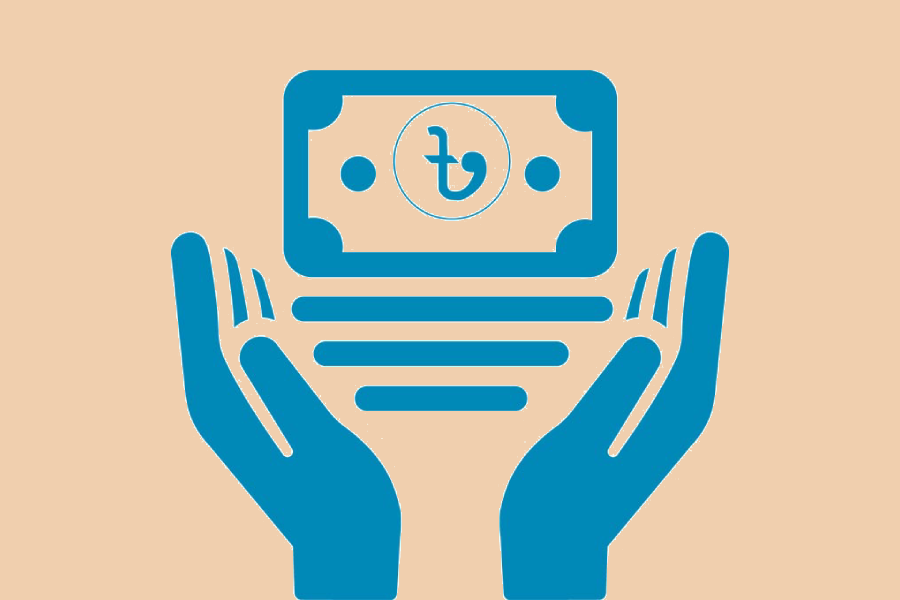The government's net borrowing from the country's banking system is expected to be negative in January, as a move is underway to repay Tk 40 million from the surplus, officials say.
The ministry of finance has set the net negative bank borrowing target at Tk 40 million for January, according to the auction calendar, issued by the Bangladesh Bank (BB) recently.
According to the calendar, the government may take up to Tk 104 billion as gross borrowing from the banking system this month by issuing treasury bills (T-bills) and bonds.
This calendar gives the schedule and the amount of T-bills and bonds to be issued through auction for raising funds from the market to partly meet the government's budget deficit.
The negative bank borrowing will be achieved after deducting Tk 104.04 billion against the government securities, which would mature this month, according to the central bank officials.
This came against the backdrop of the adequate liquidity in recent times, they said.
The government was awash with around Tk 148 billion in excess liquidity in its accounts as on December 29.
"The slow implementation of the annual development programme (ADP) in recent months along with the issuing of Shariah-based sukuk bond led to the lower borrowing from the banking system," a senior official familiar with the government debt management told the FE.
He also said the ADP implementation hit the speed bump mainly due to the Covid-19 pandemic.
According to official figures, the implementation rate of the Tk 2.14 trillion ADP has been only 18 per cent in the first five months of the current fiscal year, the lowest in 10 years.
In addition, the government received Tk 40 billion by the Islamic bond in late last year.
"Such fund has pushed up the inflow of liquidity in the government accounts," the official noted.
Tax from illegal money holders also boosted the balance of the government accounts during the period, according to the official.
The National Board of Revenue (NBR) received over Tk 10 billion taxes from the black money holders between July and December.
"The surplus position of the government's accounts will decrease after making a payment of Tk 67.86 billion for the procurement of coronavirus vaccines and other medical expenses," he said.
Talking to the FE, another BB official said, higher sales of national savings certificates also pushed down the government's bank borrowing in the recent months.
The net sales of NSCs have more than tripled in the first five months of FY'21, as bank deposits yield lower interest, he explained.
The government's net borrowing through sales of savings tools jumped by 226.02 per cent to Tk 190.45 billion during the July-November period of FY'21 from Tk 58.42 billion in the same period of the previous fiscal year, according to the official data.
Market operators, however, projected that such negative bank borrowing of the government may push up the amount of excess liquidity in the country's banking system.E
"Higher amount of excess liquidity will force the banks to cut their interest rates, particularly deposit ones for minimising their cost of funds," a senior executive of a leading private commercial bank (PCB) told the F.
Besides, the yield on government securities is likely to fall further if such negative borrowing continues, according to Syed Mahbubur Rahman, managing director and chief executive officer of Mutual Trust Bank Limited.
Meanwhile, the government's cumulative net bank borrowing stood at only Tk 20.22 billion until December 29 after adjustment of payback of Tk 286.41 billion to the central bank, according to a Bangladesh Bank (BB) confidential report.
Of the total borrowing, Tk 306.63 billion was taken out from the banks by issuing T-bills and bonds during the period under review, it added.
The government has set a higher borrowing target from the banking system to partly finance the budget deficit in FY'21.
Its bank borrowing is set to be Tk 849.80 billion in the fiscal, up from Tk 473.64 billion a year ago, according to the budget documents.
Under the arrangement, the government will borrow Tk 536.54 billion by issuing long-term bonds while the remaining Tk 313.26 billion through T-bills.
Currently, three T-bills are being transacted through auctions to adjust government borrowings from the banking system. The T-bills have 91-day, 182-day and 364-day maturity periods.
Furthermore, five government bonds with tenures of 02, 05, 10, 15 and 20 years are traded in the money market.


